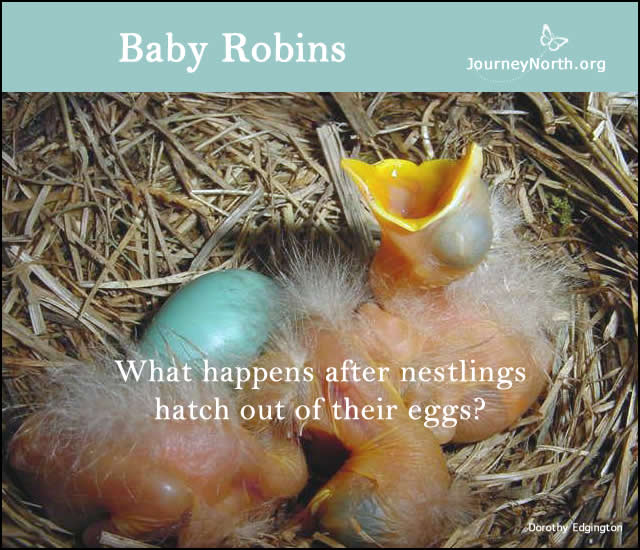By Rita Welch
Robins have reached our northernmost post! As people at the farthest reaches of the breeding range celebrate new arrivals, others are welcoming babies.

"Our male Gonondadoy is singing loudly!" announced Joy in Shageluk.
Welcome Home
Robins arrived in Shageluk, Alaska on April 23rd proclaimed Joy Hamilton of Innoko River School.
"Our male Gonondadoy — American Robin in Deg Xinag — is singing loudly! It is normal for us to see and hear them the very day they arrive. I think they get started quickly establishing territory and calling in the ladies."
Family Time
Robin parents are building nests and raising babies! Their newly hatched chicks weigh 5.5 grams, a little less than a quarter. The blind, featherless hatchlings are defenseless and hungry. Both males and females protect and feed the babies. A parent robin might make 100 feeding visits to the nest each day.
Hatchlings grow quickly. After just 13-15 days, the once-tiny and helpless babies are the size of their parents and ready to leave the nest. After fledging, it takes another 10-15 days for babies to become strong fliers and independent birds.

"All four eggs have hatched," wrote Tracy from Dresden, Ontario.
Explore the nesting map to see where people are observing nesting behavior.
Each year people write to ask questions about nests, eggs, and babies. Ornithologist, Laura Erickson shares her expertise:

 |
 |
 |
| What to Report | First Seen Report | Map | List |
Waves Report | Map | List |
 |
 |
 |
| Singing Report | Map | List |
Nesting Report | Map | List |
Earthworms Report | Map | List |
Please take a few minutes to complete our Annual Evaluation. With your help, we can document Journey North's reach, impact and value. Thank you!




